- Home
- Roald Dahl
My Uncle Oswald Page 4
My Uncle Oswald Read online
Page 4
'Were you ever a gym teacher?' I asked her.
'Shut up and concentrate,' she said, rolling me around like a lump of puff-pastry.
It was lucky for me I was young and pliable otherwise I'm quite sure I would have suffered a fracture. And that got me thinking about poor old Sir Charles and what he must have gone through in his time. Small wonder he had chosen to go into mothballs. But just wait, I thought, until he swallows the old Blister Beetle! Then it'll be her that starts blowing the whistle for time out, not him.
Lady Makepiece was a quick-change artist. A couple of minutes after our little caper had ended, there she was, seated at her small Louis Quinze desk, looking as well-groomed and as unruffled as when I had first met her. The steam had gone out of her now, and she had the sleepy contented expression of a boa constrictor that has just swallowed a live rat.
'Look here,' she said, studying a piece of paper. 'Tomorrow we're giving a rather grand dinner-party because it's Mafeking Day.'
'But Mafeking was relieved twelve years ago,' I said.
'We still celebrate it,' she said. 'What I'm saying is that Admiral Joubert has dropped out. He's reviewing his fleet in the Mediterranean. How would you like to take his place?'
I only just stopped myself from shouting hooray. It was exactly what I wanted. 'I would be honoured,' I said.
'Most of the Government Ministers will be there,' she said. 'And all the senior Ambassadors. Do you have a white tie?'
'I do,' I said. In those days, one never travelled anywhere without taking full evening-dress, even at my age.
'Good,' she said, writing my name on the guest-list. 'Eight o'clock tomorrow evening then. Good afternoon, my little man. It was nice meeting you.' Already she had gone back to studying the guest-list, so I found my own way out.
4
The next evening, sharp at eight o'clock, I presented myself at the Embassy. I was fully rigged-up in white tie and tails. A tailcoat, in those days, had a deep pocket on the inside of each tail, and in these pockets I had secreted a total of twelve small boxes, each with a single pill inside. The Embassy was a blaze of lights, and carriages were rolling up at the gates from all directions. Uniformed flunkeys were everywhere. I marched in and joined the receiving line.
'Dear boy,' said Lady Makepiece, 'I'm so glad you could come. Charles, this is Oswald Cornelius, William's son.'
Sir Charles Makepiece was a tiny little fellow with a full head of elegant white hair. His skin was the colour of biscuits, and there was an unhealthy powdery look about it, as though it had been lightly dusted over with brown sugar. The entire face, from forehead to chin, was criss-crossed with deep hairline cracks, and this, together with the powdery, biscuity skin, made him look like a terracotta bust that was beginning to crumble.
'So you are William's boy, are you?' he said, shaking my hand. 'How are you making out in Paris? Anything I can do for you, just let me know.'
I moved on into the glittering crowd. I seemed to be the only male present who was not smothered in decorations and ribbons. We stood around drinking champagne. Then we went in to dinner. It was quite a sight, that dining-room. About one hundred guests were seated on either side of a table as long as two cricket pitches. Small place cards told us where to sit. I was between two incredibly ugly old females. One was the wife of the Bulgarian Ambassador and the other was an aunt of the King of Spain. I concentrated on the food, which was superb. I still remember the large truffle, as big as a golf ball, baked in white wine in a little earthenware pot with the lid on. And the way in which the poached turbot was so superlatively undercooked, with the centre almost raw but still very hot. (The English and the Americans invariably overcook their fish.) And then the wines! They were something to remember, those wines!
But what, pray, did seventeen-year-old Oswald Cornelius know about wines? A fair question. And yet the answer is that he knew rather a lot. Because what I have not yet told you is that my own father loved wine above all other things in life, including women. He was, I think, a genuine expert. His passion was for burgundy. He adored claret, too, but he always considered even the greatest of the clarets to be just a touch on the feminine side. 'Claret,' he used to say, 'may have a prettier face and a better figure, but it's the burgundies that have the muscles and the sinews.'
By the time I was fourteen, he had begun to communicate some of this wine passion to me, and only a year ago, he had taken me on a ten-day walking tour through Burgundy during the vendange in September. We had started out at Chagny and from there we had strolled in our own time northward to Dijon, so that in the week that followed we traversed the entire length of the Cote de Nuits. It was a thrilling experience. We walked not on the main road but on the narrow rutted tracks that led us past practically every great vineyard on that famous golden slope, first Montrachet, then Meursault, then Pommard and a night in a wonderful small hotel in Beaune where we ate ecrevisses swimming in white wine, and thick slices of foie gras on buttered toast.
I can remember the two of us the next day eating lunch while sitting on the low white wall along the boundary of Romanee Conti - cold chicken, French bread, a fromage dur and a bottle of Romanee Conti itself. We spread our food on the top of the wall and stood the bottle alongside, together with two good wineglasses. My father drew the cork and poured the wine while I did my best to carve the chicken, and there we sat in the warm autumn sun, watching the grape-pickers combing the rows of vines, filling their baskets, bringing them to the heads of the rows, dumping the grapes into larger baskets which in turn were emptied into carts drawn by pale creamy-brown horses. I can remember my father sitting on the wall and waving a half-eaten drumstick in the direction of this splendid scene and saying, 'You are sitting, my boy, on the edge of the most famous piece of land in the whole world! Just look at it! Four and a half acres of flinty red clay! That's all it is! But those grapes you can see them picking at this very moment will produce a wine that is a glory among wines. It is also almost unobtainable because so little of it is made. This bottle we are drinking now came from here eleven years ago. Smell it! Inhale the bouquet! Taste it! Drink it! But never try to describe it! It is impossible to put such a flavour into words! To drink a Romanee Conti is like having an orgasm in the mouth and the nose both at the same time.'
I loved it when my father got himself worked up like this. Listening to him during those early years, I began to realize how important it was to be an enthusiast in life. He taught me that if you are interested in something, no matter what it is, go at it full speed ahead. Embrace it with both arms, hug it, love it and above all become passionate about it. Lukewarm is no good. Hot is no good, either. White hot and passionate is the only thing to be.
We visited Clos de Vougeot and Bonnes-Mares and Clos de la Roche and Chambertin and many other marvellous places. We went down into the cellars of the chateaux and tasted last year's wine from the barrels. We watched the grapes being pressed in gigantic wooden screw-presses that required six men to turn the screw. We saw the juice being run off from the presses into the great wooden vats, and at Chambolle-Musigny, where they had started picking a week earlier than most of the others, we saw the grape juice coming alive in the colossal twelve-foot-high wooden vats, boiling and bubbling as it began its own magic process of converting sugar into alcohol. And while we actually stood there watching, the wine became so fiercely active and the boiling and bubbling reached such a pitch of frenzy that several men had to climb up and sit upon the cover of each vat to hold it down.
I have wandered again. I must get back to my story. But I did want to demonstrate to you very quickly that despite my tender years, I was quite capable of appreciating the quality of the wines I drank that evening at the British Embassy in Paris. They were indeed something to remember.
We started with a Chablis Grand Cru 'Grenouilles'. Then a Latour. Then a Richebourg. And with the dessert, an Yquem of great age. I cannot remember the vintage of any one of them, but they were all pre-phylloxera.
When
dinner was over, the women, led by Lady Makepiece, left the room. Sir Charles shepherded the men into a vast adjoining sitting-room to drink port and brandy and coffee.
In the sitting-room, as the men began to split up into groups, I quickly manoeuvred myself alongside the host himself. 'Ah, there you are, my boy,' he said. 'Come and sit here with me.'
Perfect.
There were eleven of us, including me, in this particular group, and Sir Charles courteously introduced me to each one of them in turn. 'This is young Oswald Cornelius,' he said. 'His father was our man in Copenhagen. Meet the German Ambassador, Oswald.' I met the German Ambassador. Then I met the Italian Ambassador and the Hungarian Ambassador and the Russian Ambassador and the Peruvian Ambassador and the Mexican Ambassador. Then I met the French Minister for Foreign Affairs and a French Army General and lastly a funny little dark man from Japan who was introduced simply as Mr Mitsouko. Every one of them spoke English, and it seemed that out of courtesy to their host they were making it the language of the evening.
'Have a glass of port, young man,' Sir Charles Makepiece said to me, 'and pass it round.' I poured myself some port and carefully passed the decanter to my left. 'This is a good bottle. Fonseca '87. Your father tells me you've got a scholarship to Trinity. Is that right?'
'Yes, sir,' I said. My moment was coming any second now. I must not miss it. I must plunge in.
'What's your subject?' Sir Charles asked me.
'Science, sir,' I answered. Then I plunged. 'As a matter of fact,' I said, lifting my voice just enough for them all to hear me, 'there's some absolutely amazing work being done in one of the laboratories up there at this moment. Highly secret. You simply wouldn't believe what they've just discovered.'
Ten heads came up and ten pairs of eyes rose from port glasses and coffee cups and regarded me with mild interest.
'I didn't know you'd already gone up,' Sir Charles said. 'I thought you had a year to wait and that's why you're over here.'
'Quite right,' I said, 'but my future tutor invited me to spend most of last term working in the Natural Sciences Lab. That's my favourite subject, natural science.'
'And what, may I ask, have they just discovered that is so secret and so remarkable?' There was a touch of banter in Sir Charles's voice now and who could blame him?
'Well, sir,' I murmured, and then purposely, I stopped.
Silence for a few seconds. The nine foreigners and the British Ambassador sat still, waiting politely for me to go on. They were regarding me with a mixture of tolerance and amusement. This young lad, they seemed to be saying, has a bit of a nerve to be holding forth like this in front of us. But let's hear him out. It's better than talking politics.
'Don't tell me they are letting a fellow of your age handle secrets,' Sir Charles said, smiling a little with his crumbling terracotta face.
'These aren't war secrets, sir,' I said. 'They couldn't help an enemy. These are secrets that are going to help all of mankind.'
'Then tell us about them,' Sir Charles said, lighting a huge cigar. 'You have a distinguished audience here and they are all waiting to hear from you.'
'I think it's the greatest scientific breakthrough since Pasteur,' I said. 'It's going to change the world.'
The Foreign Minister of France made a sharp whistling sound by sucking air up through his hairy nostrils. 'You have another Pasteur in England at this moment?' he said. 'If so, I would very much like to hear about him.' He was a sleek oily Frenchman, this Foreign Minister, and sharp as a knife. I would have to watch him.
'If the world is about to be changed,' Sir Charles said, 'I'm a little surprised that this information hasn't yet found its way to my desk.'
Steady on, Oswald, I told myself. You've hardly begun and already you've been laying it on too thick.
'Forgive me, sir, but the point is he hasn't published yet.'
'Who hasn't? Who's he?'
'Professor Yousoupoff, sir.'
The Russian Ambassador put down his glass of port and said, 'Yousoupoff? Is he a Russian?'
'Yes, sir, he's a Russian.'
'Then why haven't I heard of him?'
I wasn't about to get into a tangle with this black-eyed black-bearded Cossack, so I kept silent.
'Come on, then, young man,' Sir Charles said. 'Tell us about the greatest scientific breakthrough of our time. You mustn't keep us in suspense, you know.'
I took a few deep breaths and a gulp of port. This was the great moment. Pray heaven I wouldn't mess it up.
'For years,' I said, 'Professor Yousoupoff has been working on the theory that the seeds of a ripe pomegranate contain an ingredient that has powerful rejuvenative properties.'
'We have millions and millions of pomegranates in my country!' the Italian Ambassador exclaimed, looking proud.
'Be quiet, Emilio,' Sir Charles said. 'Let the boy go on.'
'For twenty-seven years,' I said, 'Professor Yousoupoff has been studying the seed of the pomegranate. It became an obsession with him. He used to sleep in the laboratory. He never went out socially. He never married. The whole place was littered with pomegranates and their seeds.'
'Excuse me, please,' said the little Japanese man. 'But why the pomegranate? Why not the grape or the blackcurrant?'
'I cannot answer that question, sir,' I said. 'I suppose it was simply what you might call a hunch.'
'Hell of a long time to spend on a hunch,' Sir Charles said. 'But go on, my boy. We mustn't interrupt you.'
'Last January,' I said, 'the Professor's patience was at last rewarded. What he did was this. He dissected the seed of a pomegranate and examined the contents bit by bit under a powerful microscope. And it was only then that he observed in the very centre of the seed a minuscule speck of red vegetable tissue that he'd never seen before. He proceeded to isolate this tiny speck of tissue. But it was obviously too small to be of any use on its own. So the Professor set out to dissect one hundred seeds and to obtain from them one hundred of these tiny red particles. This is where he allowed me to assist him. I mean by dissecting out these particles under a microscope. This alone occupied us for a whole week.'
I took another sip of port. My audience waited for me to go on.
'So we now had one hundred red particles, but even when we put them all together on a glass slide, the result could still not be seen by the naked eye.'
'And you say they were red, these little things?' said the Hungarian Ambassador.
'Under the microscope they were a brilliant scarlet,' I said.
'And what did this famous professor do with them?'
'He fed them to a rat,' I said.
'A rat!'
'Yes,' I said. 'A big white rat.'
'Vy vould anybody vish to feed deese little red bomegranate tings to a rat?' the German Ambassador asked.
'Give him a chance, Wolfgang,' Sir Charles said to the German. 'Let him finish. I want to know what happened.' He nodded for me to go on.
'You see, sir,' I said, 'Professor Yousoupoff had in the laboratory a lot of white rats. He took the one hundred tiny red particles and fed every one of them to a single large healthy male rat. He did this by inserting them, under a microscope, into a piece of meat. He then put the rat in a cage together with ten female rats. I remember very clearly how the Professor and I stood beside the cage watching the male rat. It was late afternoon and we were so excited we had forgotten all about lunch.'
'Excuse me one moment, please,' the clever French Foreign Minister said. 'But why were you so excited? What made you think that anything was going to happen with this rat?'
Here we go, I thought. I knew I'd have to watch this wily Frenchman. 'I was excited, sir, simply because the Professor was excited,' I said. 'He seemed to know something was going to happen. I can't tell you how. Don't forget, gentlemen, I was only a very young junior assistant. The Professor did not tell me all his secrets.'
'I see,' the Foreign Minister said. 'Then let us proceed.'
'Yes, sir,' I said. 'Well, we were
watching the rat. At first, nothing happened. Then suddenly, after exactly nine minutes, the rat became very still. He crouched down, quivering all over. He was looking at the females. He crept toward the nearest one and grabbed her by the skin of her neck with his teeth and mounted her. It did not take long. He was very fierce with her and very swift. But here's the extraordinary thing. The moment the rat had finished copulating with the first female, he grabbed a second one and set about her in just the same way. Then he took a third female rat, and a fourth and a fifth. He was absolutely tireless. He went from one female to another, fornicating with each in turn until he had covered all ten of them. Even then, gentlemen, he hadn't had enough!'
'Good gracious me!' Sir Charles murmured. 'What a curious experiment.'
'I should add,' I went on, 'that rats are not normally promiscuous creatures. They are in fact rather moderate in their sexual habits.'
'Are you sure of that?' the French Foreign Minister said. 'I thought rats were extraordinarily lascivious.'
'No, sir,' I answered firmly. 'Rats are actually very intelligent and gentle creatures. They are easy to domesticate.'
'Go on, then,' Sir Charles said. 'What did all this tell you?'
'Professor Yousoupoff got very excited. "Oswaldsky!" he shouted - that's what he called me. "Oswaldsky, my boy, I think I have discovered the absolutely greatest most powerful sexual stimulant in the whole history of mankind!"
' "I think you have, too," I said. We were still standing by the cage of rats and the male rat was still leaping on the wretched females, one after the other. Within an hour, he had collapsed from exhaustion. "We give him too big a dose," the Professor said.'
'This rat,' the Mexican Ambassador said, 'what came of him in the end?'
'He died,' I said.
'From too much women, yes?'
'Yes,' I said.
The little Mexican clapped his hands together hard and cried out, 'That is exactly how I wish to go when I die! From too much women!'
'From too much goats and donkeys iss more like it in Mexico,' the German Ambassador snorted.

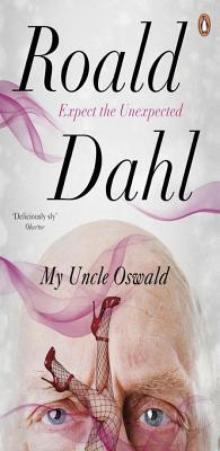 My Uncle Oswald
My Uncle Oswald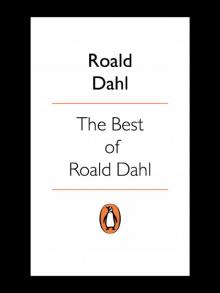 The Best of Roald Dahl
The Best of Roald Dahl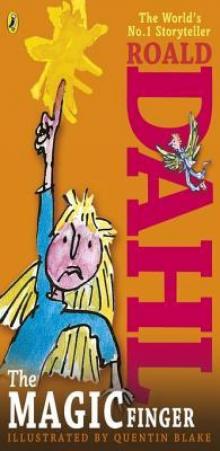 The Magic Finger
The Magic Finger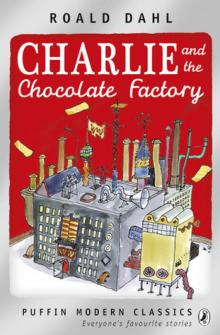 Charlie and the Chocolate Factory
Charlie and the Chocolate Factory Fantastic Mr Fox
Fantastic Mr Fox Matilda
Matilda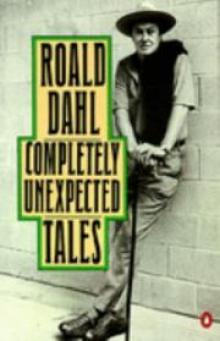 Completely Unexpected Tales: Tales of the Unexpected. More Tales of the Unexpected
Completely Unexpected Tales: Tales of the Unexpected. More Tales of the Unexpected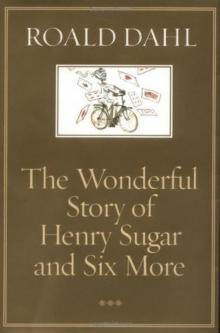 The Wonderful Story of Henry Sugar and Six More
The Wonderful Story of Henry Sugar and Six More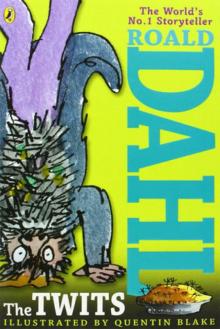 The Twits
The Twits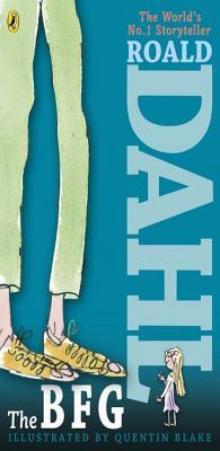 The BFG
The BFG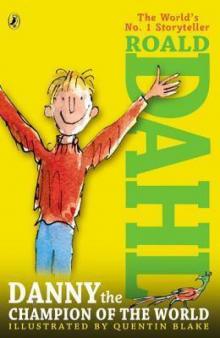 Danny the Champion of the World
Danny the Champion of the World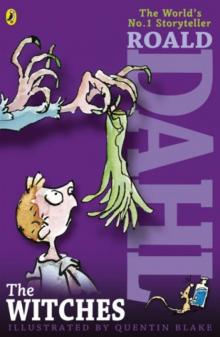 The Witches
The Witches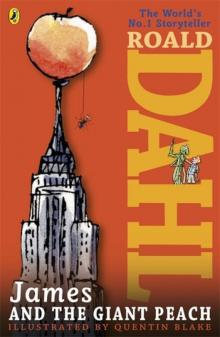 James and the Giant Peach
James and the Giant Peach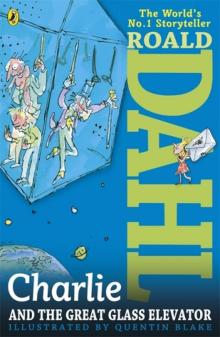 Charlie and the Great Glass Elevator
Charlie and the Great Glass Elevator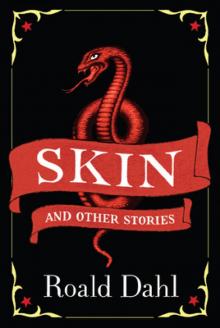 Skin and Other Stories
Skin and Other Stories Kiss Kiss
Kiss Kiss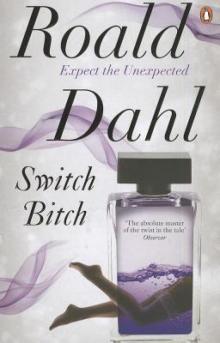 Switch Bitch
Switch Bitch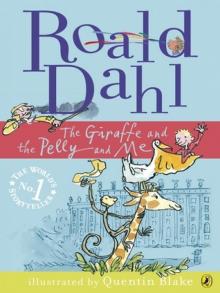 The Giraffe and the Pelly and Me
The Giraffe and the Pelly and Me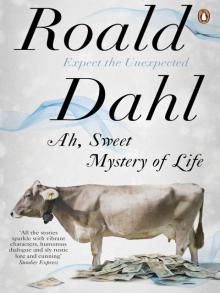 Ah, Sweet Mystery of Life
Ah, Sweet Mystery of Life Fear
Fear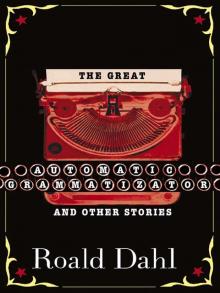 The Great Automatic Grammatizator and Other Stories
The Great Automatic Grammatizator and Other Stories Someone Like You
Someone Like You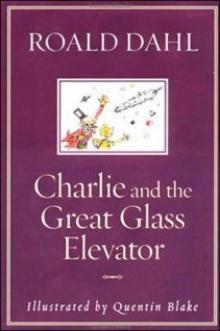 Charlie and the Great Glass Elevator c-2
Charlie and the Great Glass Elevator c-2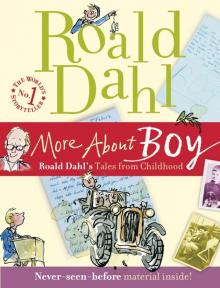 More About Boy
More About Boy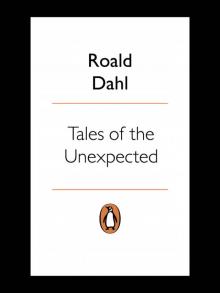 Tales of the Unexpected
Tales of the Unexpected The Umbrella Man and Other Stories
The Umbrella Man and Other Stories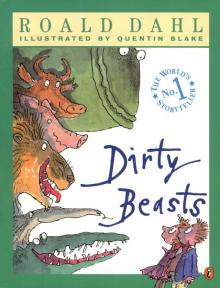 Dirty Beasts
Dirty Beasts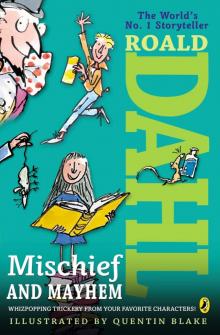 Roald Dahl's Mischief and Mayhem
Roald Dahl's Mischief and Mayhem The Collected Short Stories of Roald Dahl, Volume 1
The Collected Short Stories of Roald Dahl, Volume 1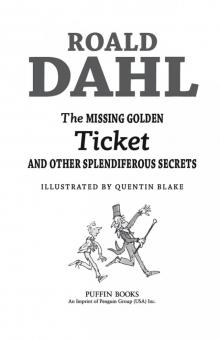 The Missing Golden Ticket and Other Splendiferous Secrets
The Missing Golden Ticket and Other Splendiferous Secrets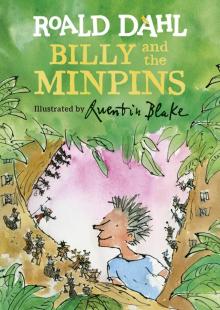 Billy and the Minpins
Billy and the Minpins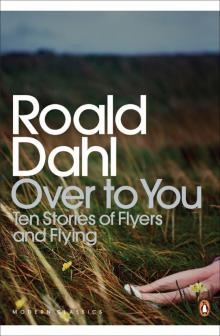 Over to You
Over to You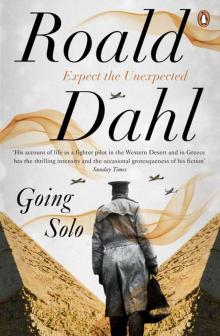 Going Solo
Going Solo Deception
Deception War
War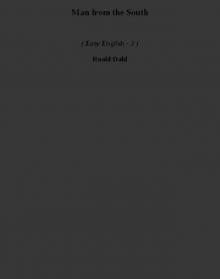 Man from the South ee-3
Man from the South ee-3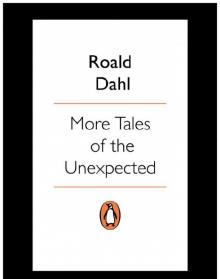 More Tales of the Unexpected
More Tales of the Unexpected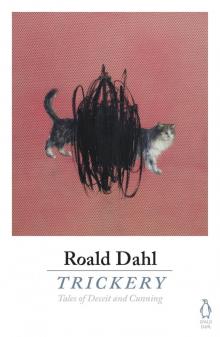 Trickery
Trickery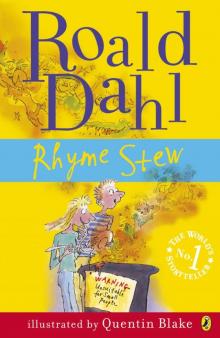 Rhyme Stew
Rhyme Stew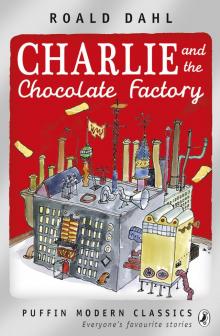 Charlie and the Chocolate Factory (Puffin Modern Classics relaunch)
Charlie and the Chocolate Factory (Puffin Modern Classics relaunch)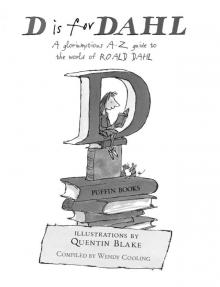 D is for Dahl
D is for Dahl Roald Dahl Whoppsy-Whiffling Joke Book
Roald Dahl Whoppsy-Whiffling Joke Book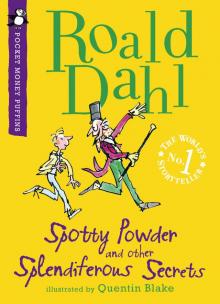 Spotty Powder and other Splendiferous Secrets
Spotty Powder and other Splendiferous Secrets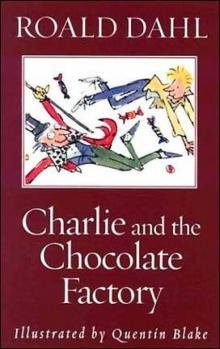 Charlie and the Chocolate Factory c-1
Charlie and the Chocolate Factory c-1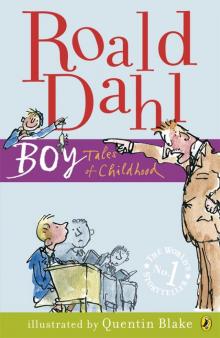 Boy
Boy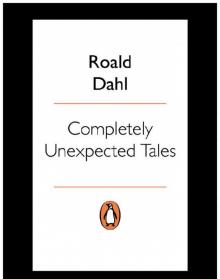 Completely Unexpected Tales
Completely Unexpected Tales Madness
Madness Innocence
Innocence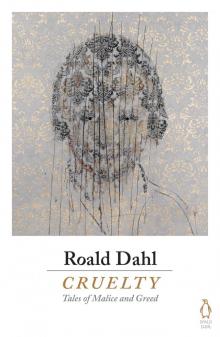 Cruelty
Cruelty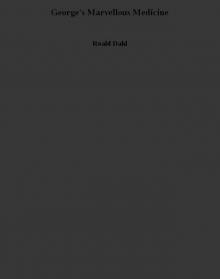 George's Marvellous Medicine
George's Marvellous Medicine